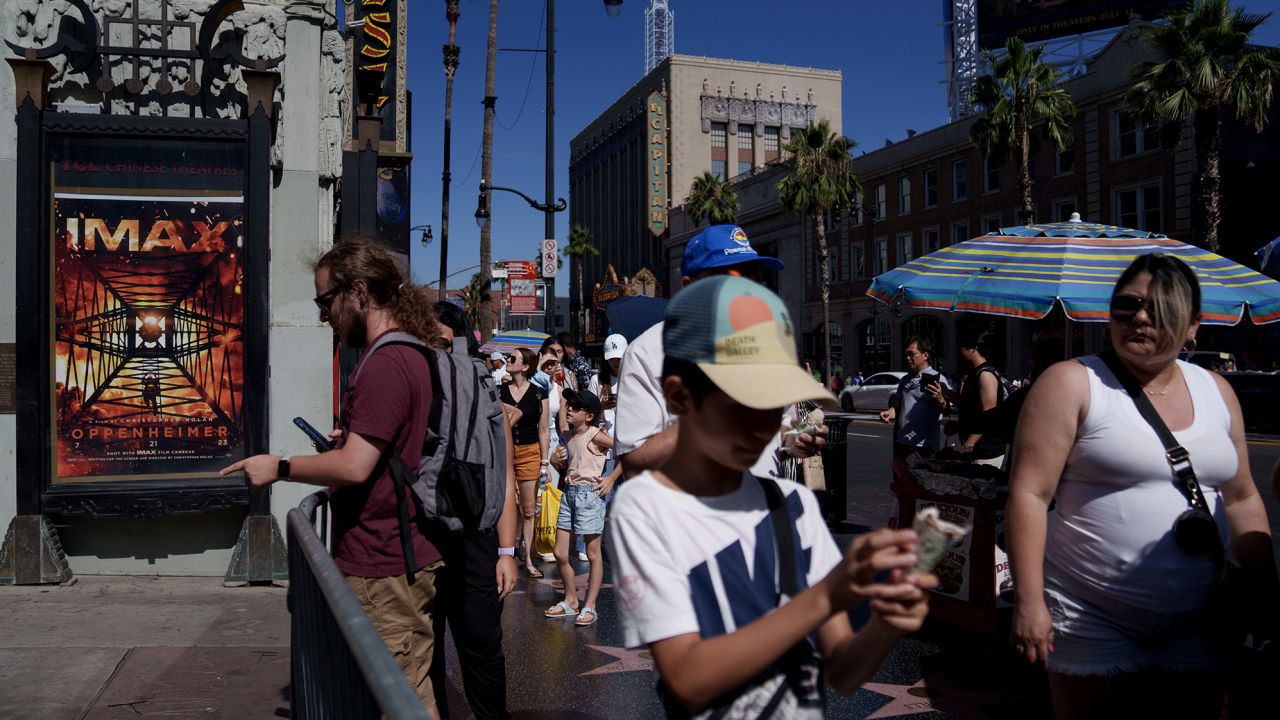CNN
—
What are some of the most packed movie screenings at the Maya Cinemas Fresno 16 in Fresno, California, these days? “Oppenheimer?” The multiplex’s dozen daily showings of “Barbie?” Actually, it’s the matinees of both.
In the early afternoons, when temperatures in central California have been circling triple-digits, people start heading into the theaters, said assistant manager Hope Torres. The heat is boosting attendance, she said — and the uptick started even before those blockbuster films opened. Maya Cinemas Fresno 16 keeps the thermostat at 68-70 degrees Fahrenheit, stocks up on frozen drinks and “when people come into the theater, they comment on how nice the air conditioning feels,” Torres said.
This summer, scorching heat waves are helping take the movie box office to new levels. AMC, the world’s biggest theater chain, on Sunday reported its largest single-week admissions revenue (July 21-27) since the company’s founding in 1920. AMC attributed this 103-year high to the incredible opening weekend of both “Barbie” and “Oppenheimer,” as well as the strong momentum that continued to carry them along.
As high or even record temperatures blanket much of the country, the combination of the cultural moment that is “Barbenheimer” and the movie industry’s inviting air-conditioned theaters are accelerating a return to movie-going.
Box office sales in 2023 are outpacing last year’s by $1 billion, said Shawn Robbins, chief analyst with Boxoffice Pro, with movies grossing $5.8 billion through July 30, versus $4.8 billlion in the same period last year.
A lot of that has to do with a strong movie release slate, he said, but record temperatures are contributing to ticket sales. “As we get into July and August, the dog days of summer, the heat can be a determining factor [at the box office].”
“Oppenheimer” stretches 180 minutes but that doesn’t seem to be deterring the box office in this climate, maybe just the opposite.
In Phoenix, Arizona, where temperatures have been hitting triple digits, ReelTok podcast host Tyler Whitmore said, “Walking from the parking lot to the theater in 115 degrees in Arizona, it doesn’t take that long to heat up. Luckily, ‘Oppenheimer’ is 3 hours long.”
Whitmore has air conditioning at home, he noted. But in movie houses, he gets to enjoy it “without running up the electricity bill.”
Theaters have been using air conditioning as a marketing draw for decades, said Salvatore Basile, author of “Cool: How Air Conditioning Changed Everything”. He explained: “Movie theaters would open their front doors so that those passing by would feel a blast of cold air and decide to buy tickets.” This early marketing technique was called “advertising air.”
Of course, many people have air conditioners at home, or fans, but they can be pricey to run and not as efficient as movie-house behemoths. Movie-theater air conditioning is generally silent, powerful and adapts quickly to temperature swings. It has to, noted the Hollywood Reporter, in a 2013 look at the history of AC in cinemas. The publication reported this is because theaters cycle from empty to full regularly, with some rooms packed while others have few guests. (Some people can even get too cold in air-conditioned rooms.)
The crowds couldn’t come soon enough for some in the movie industry.
Cineworld, the owner of Regal Cinemas, announced Tuesday that it had emerged from Chapter 11 bankruptcy after slashing billions off its debts, just as smash hits such as “Barbie” and “Oppenheimer” give the movie theater industry a much-needed lift.
(“Barbie” is distributed by Warner Bros. Pictures, which is owned by CNN’s parent company, Warner Bros. Discovery.)

Cineworld didn’t credit AC, but in June, the UK-based chain had a campaign inviting guests to “Escape the heatwave and cool off at Cineworld.”
AC changed the movie industry. Within 5 years of the introduction of air conditioning in movie theaters in the 1920s, Basile said, 3,000 movie theaters were forced to put it in just to keep up with the industry. “Before air conditioning existed in movie theaters, summer was considered the dead season.” Not anymore.
“Summer is movie-time,” said Michael O’Leary, CEO of the National Association of Theater Owners. “It is the prime time to go to movie theaters.”
More people than usual this year showed up for The Loft Cinemas’ annual 12-hour Slumber party Sci-Fi marathon in June, said Jeff Yanc, program director of the Tucson, Arizona, theater. It was a sweltering 90 degrees that night and, in the face of the heat, moviegoers were able to sit back and watch six consecutive films indoors.
The audience may have been there mostly for the night’s bill, he said, which included John Carpenter’s 1988 “They Live!” and “Mantango: Attack of the Mushroom People.”
“But it is nice to be in an air-conditioned building for twelve hours,” Yanc said.